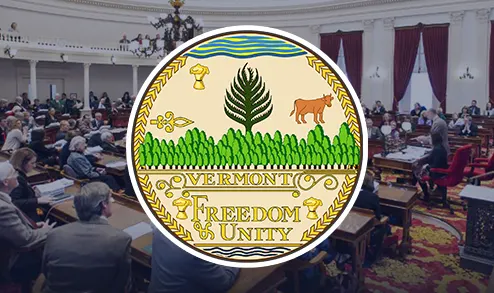 On Wednesday, the Vermont Senate made some minor changes to a bill seeking to legalize online sports betting within the state and gave it preliminary approval. The legislative effort would allow up to six sports betting companies, such as DraftKings and FanDuel, to operate in the state. The measure would also establish a fund to collect revenue and fees from the sports betting market, with a portion of that money going towards programs aimed at curbing problem gambling.
On Wednesday, the Vermont Senate made some minor changes to a bill seeking to legalize online sports betting within the state and gave it preliminary approval. The legislative effort would allow up to six sports betting companies, such as DraftKings and FanDuel, to operate in the state. The measure would also establish a fund to collect revenue and fees from the sports betting market, with a portion of that money going towards programs aimed at curbing problem gambling.
Vermont Senate Introduces Amendments to the Sports Betting Legislation
On Wednesday, the Vermont Senate gave preliminary approval to a bill seeking to legalize online sports betting in the state after making slight adjustments to the legislation. During the session, experts warned Vermont lawmakers that online sports betting could be addictive and appealing to younger individuals. While presenting H.127 on the Senate floor, Sen. Alison Clarkson, D-Windsor, explained that the bill had been designed with attention to preventing problem gambling.
The Senate decided to keep the House’s recommendation of Vermont taking at least 20% of the adjusted gross revenue that sports betting operators would generate in the state each year. However, the Senate introduced amendments regarding the operating fees that the state would charge each company.
The Senate bill proposes charging each operator a $550,000 fee once every three years, while the House suggested charging operators an annual fee based on the number of other companies in the market. The proposed fee would range from $550,000 a year for one operator to $125,000 a year for six operators.
According to Sen. Thomas Chittenden, D-Chittenden Southeast, the Senate Finance Committee hopes the proposed change would encourage sportsbooks to operate longer in Vermont. He also said that increasing fees for more companies could generate additional revenue for the state.
The Joint Fiscal Office estimated that the state would rake in around $2 million in revenue from legal sports betting in the 2024 fiscal year. The revenue would increase to roughly $4.5 million to $10.5 million in 2025, and start declining by around $10 million annually after that.
The Bill Provides for Hefty Fines on Unlicensed Sports Betting Platforms Operating within the State
Some lawmakers were worried that Vermont could be flooded with sports betting ads, which has happened in other states. To address this concern, the House Ways and Means Committee proposed a cap on the sports betting ad spending.
However, the Economic Development, Housing and General Affairs Committee, including Senator Clarkson, believed it was best not to be too strict with agreements between the state and operators regarding advertising plans. As a result, the Senate has agreed to remove language from the House version of the bill that would limit sports betting operators’ advertising spending.
Under the provisions of the legislation, sports betting marketing materials should not target individuals under 21 years old. The bill also seeks to prohibit sports betting operators from advertising their services near college campuses.
An amendment to the bill introduced by the Senate Judiciary Committee on Wednesday doubles the fines the state would impose on operators who run unlicensed sports betting. For a first offense, operators would pay a fine of $50,000. The fine for a second offense would be $150,000, and $300,000 for subsequent violations.
If the bill becomes law, it is expected that Vermont will have a legal sports betting market by January 2024.
 During the weekend, a man from Florida entered and won a women’s poker tournament, which took place at the Seminole Hard Rock Hotel & Casino in Florida. The 70-year-old man pocketed over $5k for emerging victorious in the ladies-only poker event. The incident sparked a debate over male inclusion in female sporting events. While some people take the issue of a man playing in a tournament for ladies in a lighthearted manner, others consider it a violation.
During the weekend, a man from Florida entered and won a women’s poker tournament, which took place at the Seminole Hard Rock Hotel & Casino in Florida. The 70-year-old man pocketed over $5k for emerging victorious in the ladies-only poker event. The incident sparked a debate over male inclusion in female sporting events. While some people take the issue of a man playing in a tournament for ladies in a lighthearted manner, others consider it a violation.  Yesterday, WarHouse officials revealed their plans to commence construction on the new Lincoln and Omaha gaming facilities. WarHorse Gaming Lincoln’s next phase of construction will begin shortly after the Omaha facility construction starts in July this year. The completed facility in Lincoln is to host 870 slot machines, six to ten table games, and an expanded dining area.
Yesterday, WarHouse officials revealed their plans to commence construction on the new Lincoln and Omaha gaming facilities. WarHorse Gaming Lincoln’s next phase of construction will begin shortly after the Omaha facility construction starts in July this year. The completed facility in Lincoln is to host 870 slot machines, six to ten table games, and an expanded dining area. 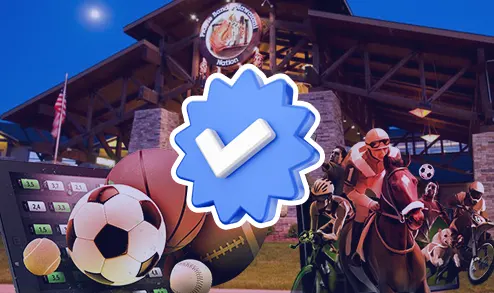 On Friday last week, the Kansas Senate and House voted in favor of a resolution that would amend the gaming compact with the Prairie Band Potawatomi Nation and allow Prairie Band Casino & Resort to offer sports betting services beyond the boundaries of its land by the end of this summer.
On Friday last week, the Kansas Senate and House voted in favor of a resolution that would amend the gaming compact with the Prairie Band Potawatomi Nation and allow Prairie Band Casino & Resort to offer sports betting services beyond the boundaries of its land by the end of this summer.  The Ministry of Digital Transformation of Ukraine has proposed to the Verkhovna Rada to remove the human factor in the issuance of casino licenses and eliminate the Commission for Regulation of Gambling and Lotteries (CRGL). According to Ukrainian News Agency, the announcement came on Minister of Digital Transformation Mykhailo Fedorov’s Telegram channel, where he explained that the government supported the bill and is pending approval from the Parliament.
The Ministry of Digital Transformation of Ukraine has proposed to the Verkhovna Rada to remove the human factor in the issuance of casino licenses and eliminate the Commission for Regulation of Gambling and Lotteries (CRGL). According to Ukrainian News Agency, the announcement came on Minister of Digital Transformation Mykhailo Fedorov’s Telegram channel, where he explained that the government supported the bill and is pending approval from the Parliament. 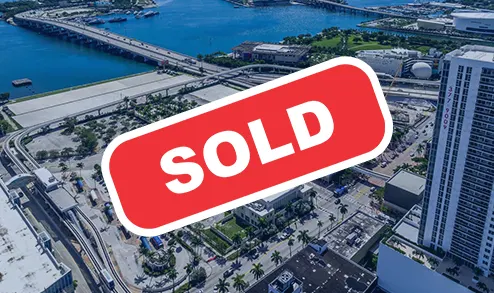 The Malaysian gambling company Genting Bhd sold 15.5 acres of land in downtown Miami’s largest chunk of underdeveloped waterfront for $1.2 billion after failing to build a planned casino resort. According to a statement, a Miami-based company called Smart City Miami, led by developer David Martin, bought the plot of land. Mr. Martin said that the company does not have plans for the property at this moment and will focus on examining the potential of the land. The transaction is expected to close later this year.
The Malaysian gambling company Genting Bhd sold 15.5 acres of land in downtown Miami’s largest chunk of underdeveloped waterfront for $1.2 billion after failing to build a planned casino resort. According to a statement, a Miami-based company called Smart City Miami, led by developer David Martin, bought the plot of land. Mr. Martin said that the company does not have plans for the property at this moment and will focus on examining the potential of the land. The transaction is expected to close later this year. 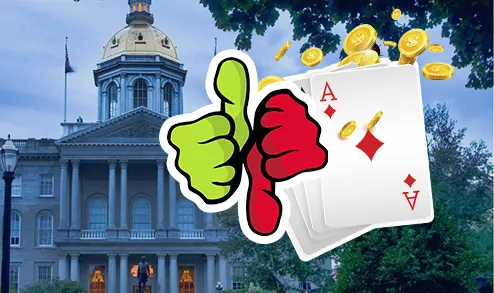 On Wednesday, the New Hampshire House Ways and Means Committee unanimously voted against Senate Bill 104, seeking to legalize online table games. The decision came just one day after the Senate’s first hearing on the matter.
On Wednesday, the New Hampshire House Ways and Means Committee unanimously voted against Senate Bill 104, seeking to legalize online table games. The decision came just one day after the Senate’s first hearing on the matter. 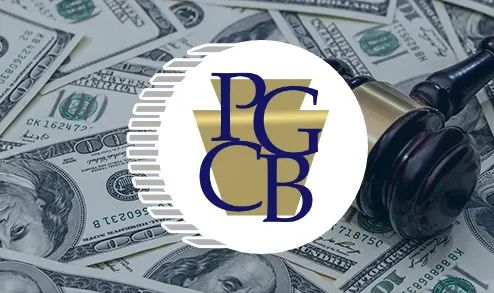 This Wednesday, the Pennsylvania Gaming Control Board imposed fines on Mount Airy, Mohegan Pennsylvania, and Sugarhouse worth $147,500 for a series of failures and revoked the licenses of three casino employees. During the board’s monthly meeting, which was held yesterday, the regulator also decided to add three individuals to the state’s involuntary self-exclusion list, prohibiting them from entering any of the state’s 17 casinos.
This Wednesday, the Pennsylvania Gaming Control Board imposed fines on Mount Airy, Mohegan Pennsylvania, and Sugarhouse worth $147,500 for a series of failures and revoked the licenses of three casino employees. During the board’s monthly meeting, which was held yesterday, the regulator also decided to add three individuals to the state’s involuntary self-exclusion list, prohibiting them from entering any of the state’s 17 casinos. 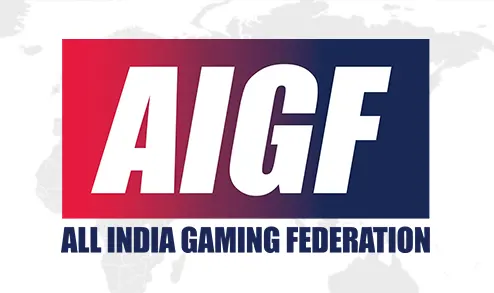 Yesterday, the media agency Moneycontrol reported that skill gaming industry body The All India Gaming Federation (AIGF), along with gambling companies Gameskraf, Games24x7, and Head Digital Works, will take legal action against Tamil Nadu’s anti-gambling law, which was approved by Governor R.N. Ravi and came into effect on April 21. The Madras High Court is to hear the case on April 27.
Yesterday, the media agency Moneycontrol reported that skill gaming industry body The All India Gaming Federation (AIGF), along with gambling companies Gameskraf, Games24x7, and Head Digital Works, will take legal action against Tamil Nadu’s anti-gambling law, which was approved by Governor R.N. Ravi and came into effect on April 21. The Madras High Court is to hear the case on April 27. 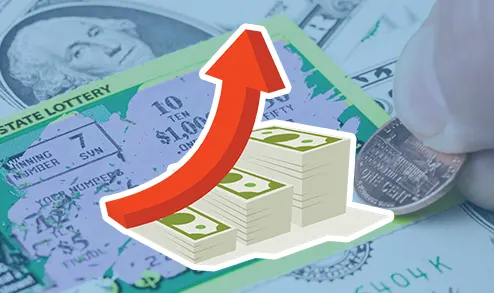 In March, the sale of instant lottery tickets experienced an exceptional surge, boosting the financial performance of the Lottery three-quarters of the way through the fiscal year. This Tuesday, Interim Executive Director of the Massachusetts Lottery Mark William Bracken said that scratch tickets worth a total of $366.4 million were sold last month, about $57.5 million more than in March 2022. The Lottery reported that its gross sales totaled $519 million in March this year, representing a significant growth compared to the same period last year.
In March, the sale of instant lottery tickets experienced an exceptional surge, boosting the financial performance of the Lottery three-quarters of the way through the fiscal year. This Tuesday, Interim Executive Director of the Massachusetts Lottery Mark William Bracken said that scratch tickets worth a total of $366.4 million were sold last month, about $57.5 million more than in March 2022. The Lottery reported that its gross sales totaled $519 million in March this year, representing a significant growth compared to the same period last year.